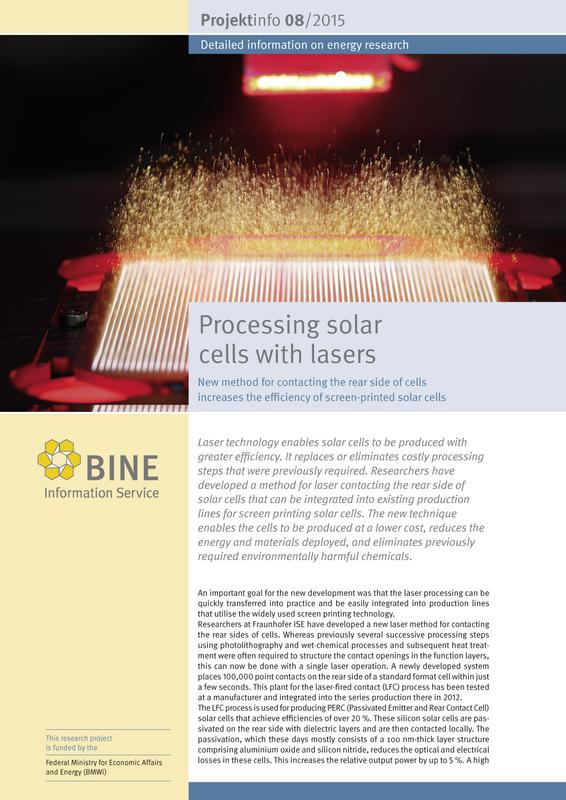
Faster Solar Cell Production Using Laser Technology

The BINE-Projektinfo brochure "Processing solar cells with lasers" (08/2015)
© BINE Informationsdienst
The BINE-Projektinfo brochure “Processing solar cells with lasers” (08/2015) presents a new manufacturing process for silicon solar cells in which a laser applies 100,000 point contacts on the rear side of screen-printed solar cells in a single operation. Previous methods required not only several steps to achieve this but also environmentally harmful chemicals.
New process for cost-effective and efficient screen-printed solar cells
The laser is used to produce the necessary contacts on the rear side of silicon solar cells. Here there is a passivation layer. This needs to remain as intact as possible during the processing to ensure the electrical and optical performance of the cells.
The laser method makes it possible to sparingly perforate every square centimetre of this layer with 400 point contacts in order to connect the active layers of the cells with one another.
This is done very precisely and in seconds. The cells produced in this manner have an efficiency of more than 20%. The method has been successfully integrated into the series production of a manufacturer.
The Fraunhofer Institute for Solar Energy Systems (FhG-ISE) has developed the new laser method in cooperation with partners. In 2014, three employees at the Institute were awarded first prize at the international “Innovation Award Laser Technology” competition for this development.
In a further project, scientists have also used a laser-based texturing technique that has managed to achieve the record efficiency of 21.7% for industrially produced PERC cells.
The BINE-Projektinfo brochure “Processing solar cells with lasers” (08/2015) follow this link:
http://www.bine.info/en/press/press-releases/press/pressemitteilung/mit-lasern-s…
Uwe Milles/Birgit Schneider
presse(at)bine.info
About BINE Information Service
Energy research for practical applications
The BINE Information Service reports on energy research topics, such as new materials, systems and components, as well as innovative concepts and methods. The knowledge gained is incorporated into the implementation of new technologies in practice, because first-rate information provides a basis for pioneering decisions, whether in the planning of energy-optimised buildings, increasing the efficiency of industrial processes, or integrating renewable energy sources into existing systems.
About FIZ Karlsruhe
FIZ Karlsruhe – Leibniz Institute for Information Infrastructure is a not-for-profit organization with the public mission to make sci-tech information from all over the world publicly available and to provide related services in order to support the national and international transfer of knowledge and the promotion of innovation.
Our business areas:
• STN International – the world’s leading online service for research and patent information in science and technology
• KnowEsis – innovative eScience solutions to support the process of research in all its stages, and throughout all scientific disciplines
• Databases and Information Services – Databases and science portals in mathematics, computer science, crystallography, chemistry, and energy technology
FIZ Karlsruhe is a member of the Leibniz Association (WGL) which consists of 87 German research and infrastructure institutions.
http://www.bine.info/en – BINE Informationsdienst












